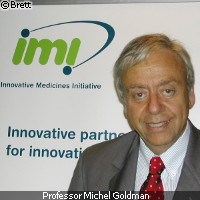IMI's new Executive Director: 'My priority is to attract the best scientists'
Earlier this year, Belgian immunology professor Michel Goldman was named as the new Executive Director of the Innovative Medicines Initiative (IMI) Joint Technology Initiative (JTI). Before starting work in his new post on 16 September, he spoke to CORDIS News about his career so far and his hopes for the IMI. A physician by training, Michel Goldman started his career caring for patients with kidney problems. His interest in research was motivated by the realisation that further studies were urgently needed if the condition of his patients was to be improved. Over the years, his research has covered the mechanisms of autoimmune diseases and the way adjuvants work in vaccines. His latest work focuses on preventing the rejection of transplanted organs, and in particular on ways of reducing the amount of immunosuppressant drugs that transplant patients have to take. Professor Goldman describes working with industry as 'absolutely necessary'. 'When research is fruitful, when you discover targets or pathways which might give rise to new therapies, you need partnerships with industry in order to translate this into drugs that you can find in your pharmacy,' he explains. In 2004, he set up the Institute for Medical Immunology (another IMI), the first public-private partnership in the biomedical sector in the Walloon region of Belgium. The partnership focuses on a range of immune-related subjects; the industrial partner has first refusal rights on any discoveries made. For Professor Goldman, applying for the post of Executive Director at the Innovative Medicines Initiative was a 'natural evolution' in his career. 'I realised that this type of partnership is absolutely necessary if you want to translate what you do in research for the benefit of patients, which as a physician, is my personal aspiration and objective,' he says. As a key actor of the Walloon cluster dedicated to healthcare, he appreciated that in order to take full advantage of this type of partnership, you really need to scale it up to a larger level. 'Europe was a natural evolution for me,' he adds. Another facet of the Innovative Medicines Initiative that attracted Professor Goldman was its focus on addressing patient concerns and the fact that it brings together patients, industry and academia. His first priority in the post will be to spread the word about the IMI. The second call for proposals is due to be launched at the end of October, and he will spend the first weeks of his job explaining the topics of this second call and what the IMI is looking for in project proposals. 'The goal of this intense communications drive is to attract the best scientists,' he explains. One priority for the second call is cancer; here the IMI is looking for projects that could eventually lead to new, more effective drugs. They are also interested in projects investigating new biomarkers that can detect and quantify abnormal cells and allow doctors to assess the scale of the disease. There is also a focus on infectious diseases. 'There, the goal is to develop new tests allowing doctors to detect infections much more rapidly, I would say at the bedside,' said Professor Goldman. In addition, the IMI is keen to see new tests that can predict which infections will be resistant to antibiotics. As Professor Goldman points out, this will allow doctors to prescribe antibiotics, secure in the knowledge that they will fight the infection efficiently. The inflammatory immune-mediated diseases rheumatoid arthritis, systemic lupus erythematosus and inflammatory bowel disease form another priority area. Current treatments for these conditions are associated with unpleasant side effects. Finally, the second call will fund projects on knowledge management. 'Each day in all labs in industry and in medical research centres, we generate a large amount of data,' comments Professor Goldman. Only a fraction of these data is analysed in detail. Exchanging and comparing more data could lead to major advances in pharmaceuticals. The IMI has come in for criticism in the past over its funding rules, as some universities have claimed that participating in IMI projects is simply too expensive for them. Professor Goldman already has a meeting with representatives of Europe's universities in his agenda, and is optimistic that a solution will be found. 'To attract the best scientists, your funding scheme must obviously be attractive,' he told CORDIS News. 'So we will discuss this, but I am confident that we will find solutions.' These could include technical accounting issues and a change in the way universities work out the budget of a project, he suggests. Professor Goldman has a clear vision of where he hopes the IMI will be five years from now. In addition to concrete results in the development of biomarkers, he also hopes that new knowledge management networks and education and training systems will be in place. On a more general level, he hopes that Europe will have become established as a region 'where drug development is at the forefront, where the best scientists are really encouraged to stay, and where patients realise that indeed every effort is made both by private companies and public bodies to provide them with the best treatments as rapidly as possible'. 'I think one of the measures of success will be to reinstall in Europe more confidence between the patients and those who build future medicines,' he adds. And although he is keen to emphasise the importance of the IMI Joint Undertaking's autonomy, Professor Goldman is also keen to liaise closely with the European Commission to ensure that synergies between the IMI and other initiatives are identified and exploited. The IMI is one of a number of JTIs funded under the Seventh Framework Programme (FP7). These public private partnerships bring together funding from industry and the public sector in a number of areas. Details of the first projects to receive funding under the IMI were released earlier this year.
Countries
Belgium



